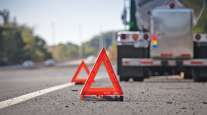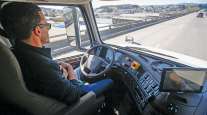Humans Slapped and Shouted at Robot Cars in Two of Six California DMV Crash Reports This Year

The human response to possible takeover by robot overlords is off to a troubling start.
Of six crash reports involving robot cars filed in California so far this year, two involved a human approaching the car and attacking it.
On Jan. 2, a Chevy Bolt EV operated by General Motors’ Cruise driverless car division in San Francisco’s Mission District was waiting at a green light for pedestrians to cross when a man “ran across Valencia Street against the ‘do not walk’ symbol, shouting, and struck the left side of the Cruise AV’s rear bumper and hatch with his entire body,” damaging a tail light, according to a report filed with the California Department of Motor Vehicles.
RELATED: Self-driving cars with no in-vehicle backup driver get OK for California public roads
No one was injured and police were not called, the report said. The car was in autonomous mode but a driver was behind the wheel, as required by current law.
On Jan. 28, a GM Cruise Bolt EV with a human driving the car stopped behind a taxi on Duboce Avenue in San Francisco, when “the driver of the taxi exited his vehicle, approached the Cruise AV, and slapped the front passenger window, causing a scratch,” the incident report said. There were no injuries and police were not called.
How a hand slap could scratch windshield glass was a subject the report left undiscussed.
RELATED: Toyota adds $2.8 billion to software push for self-driving cars
Cars capable of autonomous operation can be legally tested on public roads in California with permits if a human sits behind the steering wheel, ready to take control. Crashes, however minor, must be reported to the DMV.
Of the six accidents reported so far in 2018, three were in autonomous mode and three in manual mode. The four that did not involve human attack were of the fender-bender variety. None involved injuries and damage ranged from minor to none.
Newly issued regulations will allow cars with permits to be driven on public roads with no human driver on board starting April 2. The crash-report requirement will remain.
Last year, 27 accident reports were filed.
Distributed by Tribune Content Agency, LLC




